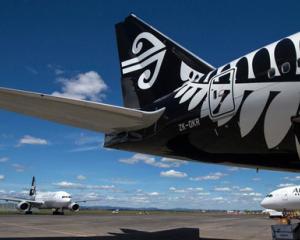The latest development in the turbulent aviation world will be watched in Dunedin with interest, hope and wariness.
The Australian Competition and Consumer Commission (ACCC) has put aside its earlier rejection and cleared for take-off for three years an alliance on transtasman services between Virgin Blue (Pacific Blue) and Air New Zealand.
The ACCC, in its draft determination, said code sharing and co-operation between the airlines would lessen competition on several routes.
For Dunedin to Brisbane, in particular, it was as blunt as to say the alliance would provide a monopoly and the partners would unilaterally raise fares.
Given the bumpy ride and harsh experience of Dunedin travellers with air services over many years, the ACCC was right, whatever Air New Zealand's protestations. Dunedin people well remember how Freedom Air flights were replaced by Air New Zealand services and how the promises of the time were unfulfilled.
Air New Zealand withdrew international flights from Momona in October last year, returning only this year, and then only seasonally.
This year, too, Dunedin has felt the effect of the departure from the domestic market of Pacific Blue.
What has won the often hard-nosed ACCC over are conditions proposed by the alliance airlines to try to win the regulator's approval. For routes with no other, or limited, competition, the two companies offered, at least, to maintain current route capacity.
The ACCC has adopted this plan and has applied it to several Wellington routes as well as Dunedin-Brisbane and Queenstown-Sydney flights.
The key to competitive prices is capacity.
No airline wants to fly near empty planes so prices are set accordingly.
Hopefully, Air New Zealand and Pacific Blue arrange their Dunedin charges so that it is seldom worthwhile to drive to Christchurch to get better deals.
Maybe, too, with rationalised times and services across the country some expansion might be possible - even a return to year-round Sydney flights.
Maybe Virgin's Brisbane hub can be used more by Southern travellers leaving from Dunedin and going to other parts of Australia, thereby avoiding departures from Christchurch or Auckland.
The benefits of co-operation for the airlines are clear.
Air New Zealand will have better access to cities outside Brisbane, Sydney and Melbourne through the Virgin network, and Virgin will fly more Air New Zealand passengers.
Timetables can be rationalised to the benefit of both the airlines and travellers, while facilities, promotions and services can be shared.
According to the ACCC, 52 Pacific Blue flights depart within a few minutes of Air New Zealand on the same route.
Both airlines fly Sydney to Queenstown on the same two days of the week.
Travellers will have more choice and flexibility and the airlines might be able to boost yields when the flights are spread over four days.
Qantas and its budget subsidiary Jetstar have obviously been turning up the pressure on other airlines on the busy transtasman route, which is now approaching 5.5 million passenger movements a year.
ACCC figures put the Qantas-Jetstar share at 33% with Air New Zealand and Pacific Blue at 56%.
One suspects the 10% Jetstar share, with its relatively recent arrival and its aggressive promotion, has been rising at the expense of the others.
The intense competition has seen Pacific Blue losing money, and one danger was that it would pull right back in favour of profitable Pacific routes.
Meanwhile, other international airlines fly on or through Auckland and Christchurch, often with capacity to fill.
This has kept rivalry into those airports fierce.
The ACCC was ambivalent about any anti-competitive effect on Queenstown-Sydney flights, but it was clear on the Dunedin routes and insisted on capacity guarantees.
While New Zealand's Transport Minister Stephen Joyce still has to agree before the alliance can go ahead, it would be most surprising if he rejected it, especially because most of the earlier opposition from Wellington was withdrawn.
The guarantees are absolutely essential to make sure Dunedin International Airport and southern travellers are not once again disadvantaged.


